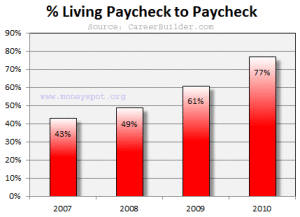 Corporations stress test their budget all the time, so why shouldn’t ordinary consumers do the same thing – stress test your budget. Planning cash flow and monthly payments whether you are a CFO for a large major corporation or a homeowner trying to manage his budget and meet his monthly payments is of the utmost importance to avoid missing payments and being declared delinquent on loans or mortgages. They also assume worst case scenarios and assess whether their companies can handle these situations and survive.
Corporations stress test their budget all the time, so why shouldn’t ordinary consumers do the same thing – stress test your budget. Planning cash flow and monthly payments whether you are a CFO for a large major corporation or a homeowner trying to manage his budget and meet his monthly payments is of the utmost importance to avoid missing payments and being declared delinquent on loans or mortgages. They also assume worst case scenarios and assess whether their companies can handle these situations and survive.
Stress Test Your Budget – Personal
Consumers can do this easily by stress testing their budget while at the same time, saving themselves thousands of dollars in interest payments. For example, if you buy a home and go with the minimum down payment, your monthly payments are going to be high.
The interest rate you pay will be higher and the total amount of interest you pay will be thousands of dollars higher than it needs to be. Those dollars can be used for other things for your family, however unfortunately it is all going to the mortgage company.
On the other hand if you make the maximum down payment and also make extra payments each year to your mortgage, you can save thousands of dollars in interest charges which of course are always better in your account than the mortgage companies. Over the life of a mortgage, you can literally save thousands of dollars depending on the term of the mortgage and the interest rate.
A proper stress test requires a detailed budget that includes all of your expenses for your current lifestyle and the home that you have or are purchasing. Make sure that you are very realistic and include all of the miscellaneous things that we all purchase from time to time.
If you do not have a balanced budget, then you will have some more work to do to make sure that you are not spending more than what you are taking in.
Plan for Emergencies
Once you have a balanced budget, the next step is to assess what emergencies could occur that would place stress on your budget and your ability to meet your budget. Various things come to mind, however it really depends on your personal life.
Examples include major car repairs, a new roof, furnace repairs, additional children, loss of job etc. Any of these items can place major stress on your budget. Determine what the impact is. Assess what you would need to do to accommodate this additional expense on your budget.
During good times, it pays to pay your mortgage down as fast as possible. You can save thousands in interest charges. Plan to save for these emergency expenses. You may not know which one will occur.
However for most of us there will be an emergency of some kind that we will need to deal with. Develop a savings plan as part of your budget that calls for some amount of money to be set aside from every pay check.
A savings plan will give you the freedom to deal with your emergency when it comes. Without causing catastrophic problems for your budget. If you suddenly need a new roof for an example, you can draw from your savings instead of taking out a new loan
A new loan payment could jeopardize your budget and put it in a negative loss situation or putting it another way you are spending more than you are taking in.
We have added a few tips to consider for your review of your budget.
Stress Test Your Budget Top Tips to Consider:
Develop a budget
- Stress test your budget to see how well you can absorb emergency expenses
- Make sure you have a balanced budget, cut expenses if it is not balanced
- Your budget should include a savings plan for emergency expenses
- Review your budget. Stress test your budget at least once per year. Also after any substantial change in your financial situation
Buying a house is a major financial commitment, so we have included a few tips covering this area as well.
Take a shorter mortgage amortization:
- The shorter the life of the mortgage, the less you pay in interest.
- Cutting your amortization period by 5 years from 30 to 25 years could save you over $53,000 in interest. You will be mortgage-free faster and your monthly payments will only increase by $84
Make a larger down payment:
- If you can provide a bigger down payment, it’s an excellent way of helping you pay less interest over the life of your mortgage.
Make sure you can afford what you signed up for:
- Stress test your financial budget using a mortgage payment based on a higher interest rate
- Total housing costs (mortgage payments, property taxes, heating costs, etc.) should not consume more than one-third of household income.
Make pre-payments when you can:
- Pay weekly or bi-weekly instead of monthly.
- Take advantage of 20+20 prepayment privileges:
- Increase your mortgage payment (principal and interest) by up to 20 per cent over the current payment. This option can be exercised  once each calendar year, at any time, without charge.
- Prepay up to 20 per cent of the original mortgage principal each calendar year.
Always make sure you save for a rainy day:
- If you are up to your maximum in debt, you may not be well prepared for the leaky roof along the way.
- Have savings payments deducted directly off of your pay check so you are not tempted to spend your savings.
Think carefully about fixed vs. variable:
While variable rates mortgages have been a winning strategy over the long term, fixed rate mortgages (currently at historic lows) come with the peace of mind of being insulated against rate increases.
Stress Test Your Budget now just like the professionals do at major corporations.
 Many consumers feel that they should just continue living life in retirement. Live the same way they did when they were working. They do not consider that they may have to cut spending in retirement. The unfortunate reality is that with less income they are going to have to make some choices. Regarding their lifestyle and how they spend their money. There are some easy ways to cut spending in retirement. Fortunately some expenses will decline naturally.
Many consumers feel that they should just continue living life in retirement. Live the same way they did when they were working. They do not consider that they may have to cut spending in retirement. The unfortunate reality is that with less income they are going to have to make some choices. Regarding their lifestyle and how they spend their money. There are some easy ways to cut spending in retirement. Fortunately some expenses will decline naturally.
